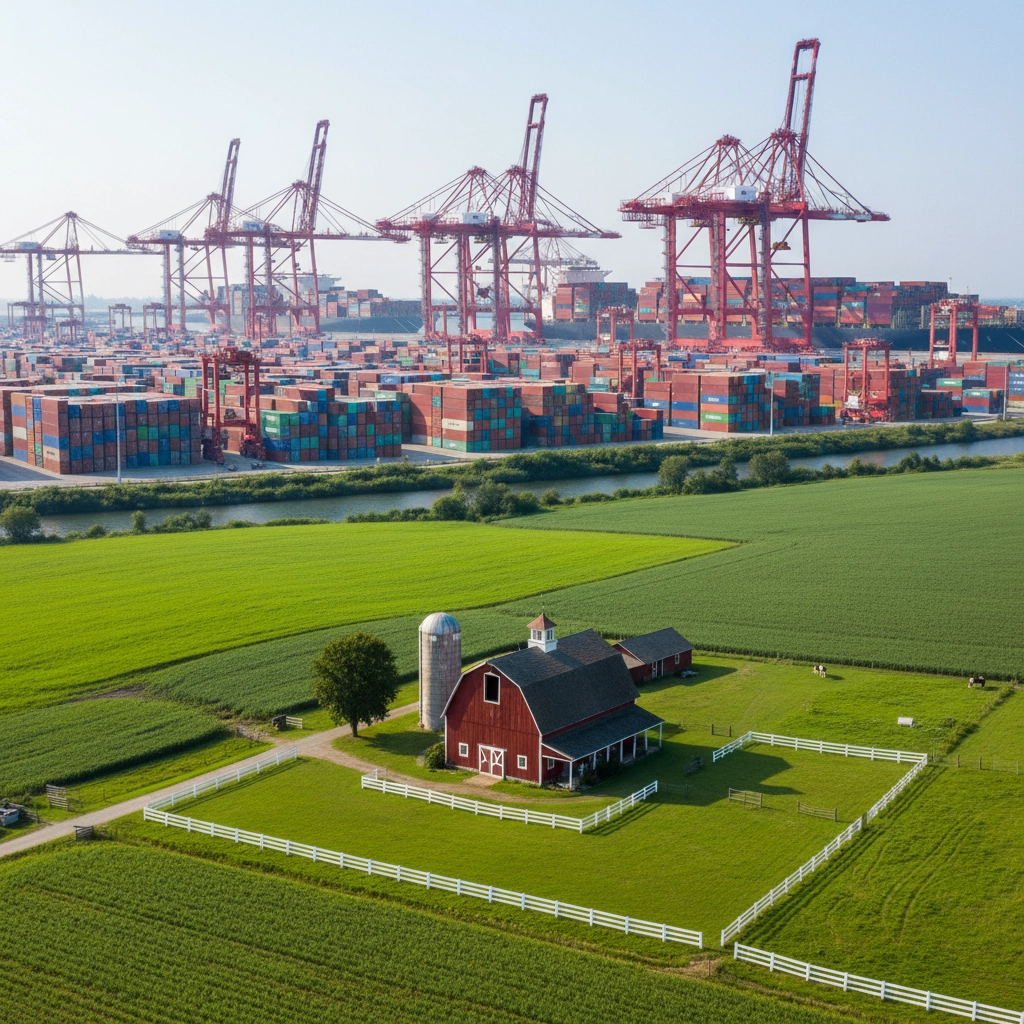
DINWIDDIE 2026: HOW WE GOT HERE : A STEP-BY-STEP CASE ON INFLATION, CORRUPTION, AND TAKING OUR GOVERNMENT BACK
- Randyb Dinwiddie
- Nov 2
- 5 min read
meta_description: "Discover the timeline behind U.S. inflation, offshoring, and Washington corruption—plus what Randy Dinwiddie's 2026 campaign plans to do about it." tags: - inflation timeline - campaign press release - Dinwiddie 2026 - U.S. supply chains - offshoring jobs - Washington corruption - reindustrialization - Buy American - food security - foreign land ownership slug: "dinwiddie-2026-inflation-corruption-government-takeback" terms: "This content is presented for informational and campaign purposes by Dinwiddie 2026. For electoral updates, visit the official Missouri campaign website."
FOR IMMEDIATE RELEASE
Contact: Dinwiddie 2026 Campaign Email:info@dinwiddie2026.com Location: Missouri, USA Date: November 3, 2025
The Timeline That Led to Today's Economic Crisis
"We the People are the government. It's time to confront how we got runaway prices and a hollowed-out economy: and hold accountable the people who sold out American jobs." : Randy Dinwiddie
The inflation crisis hitting American families didn't happen overnight. It's the result of decades of policy decisions that prioritized corporate profits and foreign interests over American workers and communities. Here's the step-by-step breakdown of how we got here: and what we're going to do about it.

Step 1: Late 1990s–2000: Washington Opens the Floodgates to China
The foundation of today's economic crisis was laid when Congress granted China Permanent Normal Trade Relations (PNTR) in 2000. President Bill Clinton signed this historic agreement on October 10, 2000, clearing the final road to China's WTO entry in 2001.
This decision ended annual human-rights reviews and locked in low-tariff access for imports. Washington sold this to the American public as a win for farmers and consumers, promising lower prices and expanded markets. Instead, it supercharged offshoring and created dangerous import dependence that would haunt us for decades.
Step 2: 2001–2018: Factories Move; U.S. Communities Pay the Price
The consequences of the China trade deal became clear quickly. As imports surged, the U.S. trade deficit with China expanded dramatically. Research estimates that 3.7 million U.S. jobs: about 2.8 million in manufacturing: were displaced between 2001–2018.
These losses touched every state and nearly every congressional district. When you lose production capacity, you become price-takers in the global supply chain. That fragility shows up as shortages and higher prices when economic shocks hit: exactly what we experienced during the pandemic.

Step 3: 2013–Present: "Debt Diplomacy" Abroad, Leverage at Home
Beijing's Belt and Road Initiative put vulnerable nations into long-term dependency through strategic lending. The widely cited Hambantota Port case ended in a 99-year lease after Sri Lanka fell behind on payments to Chinese lenders.
This model demonstrates how economic leverage becomes strategic leverage: an approach Americans now recognize in our own supply chains. When you depend on a strategic rival for critical goods, you lose negotiating power and national sovereignty.
Step 4: 2010s–2020s: Foreign Stakes in U.S. Farmland Rise
Federal data show foreign ownership of U.S. agricultural land exceeding 40 million acres by 2021 and reaching 43.4 million acres by 2022. While this represents a small share of total farmland, the trend has triggered bipartisan concern.
Chinese-linked holdings are a fraction of that total, yet the trend has sparked state and federal pushback because food security and proximity to military bases are national security issues. When foreign adversaries control our food supply and strategic land, American families pay the price.

Step 5: 2020–2022: Pandemic Shocks + Stimulus Collide with Fragile Supply Chains
Once production moved offshore, COVID disruptions and policy responses met a hollowed-out domestic manufacturing base. The result was predictable: inflation jumped 7.0% in 2021 (December-to-December): the biggest increase since 1981: and stayed elevated into 2022 before slowly easing.
The 2021 expanded Child Tax Credit sent monthly payments up to $300 per child under 6 and $250 for ages 6–17 from July through December 2021. This boosted consumer demand into severely constrained supply chains. The payments ended after 2021, but the inflationary damage was done.
Step 6: 2023–2025: Prices Cool: Pain Lingers
Consumer Price Index (CPI) inflation has moderated compared with the 2021 peak, but families still face higher baseline prices for essentials like food, housing, and energy. The structural cause: outsourced production and strategic dependence: remains unchanged, and the trade gap persists even as tariff policies shift from one administration to the next.
What Voters Deserve to Know (and What We'll Do)
This economic crisis wasn't an accident. It was a chain of deliberate decisions: permanent market access for China, the export of U.S. manufacturing capacity, and then massive stimulus poured on top of broken supply chains.
The result was entirely predictable: shortages + increased demand = inflation. American communities lost good-paying jobs, Washington insiders got rich off the transition, and America's economic leverage shrank dramatically.

Our Plan to Restore Accountability and Rebuild Capacity
Full Public Audits of Congressional Wealth We will demand full, public audits of members of Congress and senior officials whose net worth exploded while in office. Voters deserve to see how many homes and what assets their "representatives" hold, and exactly how they acquired them. Public disclosures and independent trackers like OpenSecrets already aggregate much of this data; we will put it in front of every voter, every year.
End Strategic Dependence on Adversaries Critical supply chains: medicine, semiconductors, energy components, food inputs: must be U.S.-made or secured via trusted allies. We cannot allow strategic rivals to hold leverage over American families' basic needs.
Targeted Re-Industrialization We will implement fast-track permits, domestic procurement preferences, and tax credits tied specifically to U.S. production and U.S. jobs. American workers built the greatest economy in history: they can do it again with the right policies.
Trade Reset with Real Enforcement Our trade policy will include real-time monitoring of import surges, tariff snapbacks for predatory pricing, and Buy American rules for all federally funded projects. No more empty promises: real results for American workers.
Food & Land Security We will implement strict scrutiny of foreign land purchases near strategic sites, with mandatory disclosure and rapid divestiture where national security risks exist.
Inflation Relief Through Supply, Not Slogans We will expand domestic capacity and competition so prices come down because we make more here: not because we accept shortages and higher interest costs forever.

Statement from Randy Dinwiddie (Dinwiddie 2026)
"Washington promised that shipping our jobs overseas would make life cheaper for American families. They were wrong. It made us dependent, it made a few insiders rich, and it left working families paying more for everything from groceries to gasoline.
The record shows exactly how we got here: PNTR in 2000, WTO entry in 2001, millions of jobs displaced, supply chains offshored, and then stimulus pumped into scarcity. We will expose the insiders who profited from this betrayal, rebuild what we lost, and bring prices down the only honest way: by making things in America again.
This isn't about politics as usual. This is about restoring a government that serves the people who elect it, not the special interests who fund it. Missouri families deserve better, and we're going to deliver it."
About Dinwiddie 2026
Randy Dinwiddie is a Missouri entrepreneur and founder of Amerishop Services LLC and Dependable Brokers. His 2026 campaign stands for accountability, re-industrialization, secure supply chains, and a government that serves the people: not itself.
For more information about the Dinwiddie 2026 campaign, visit the official Missouri campaign website or contact info@dinwiddie2026.com.
This content is presented for informational and campaign purposes by Dinwiddie 2026. For electoral updates, visit the official Missouri campaign website.
Ghost written by Amerishop Services editorial team
END












































Comments